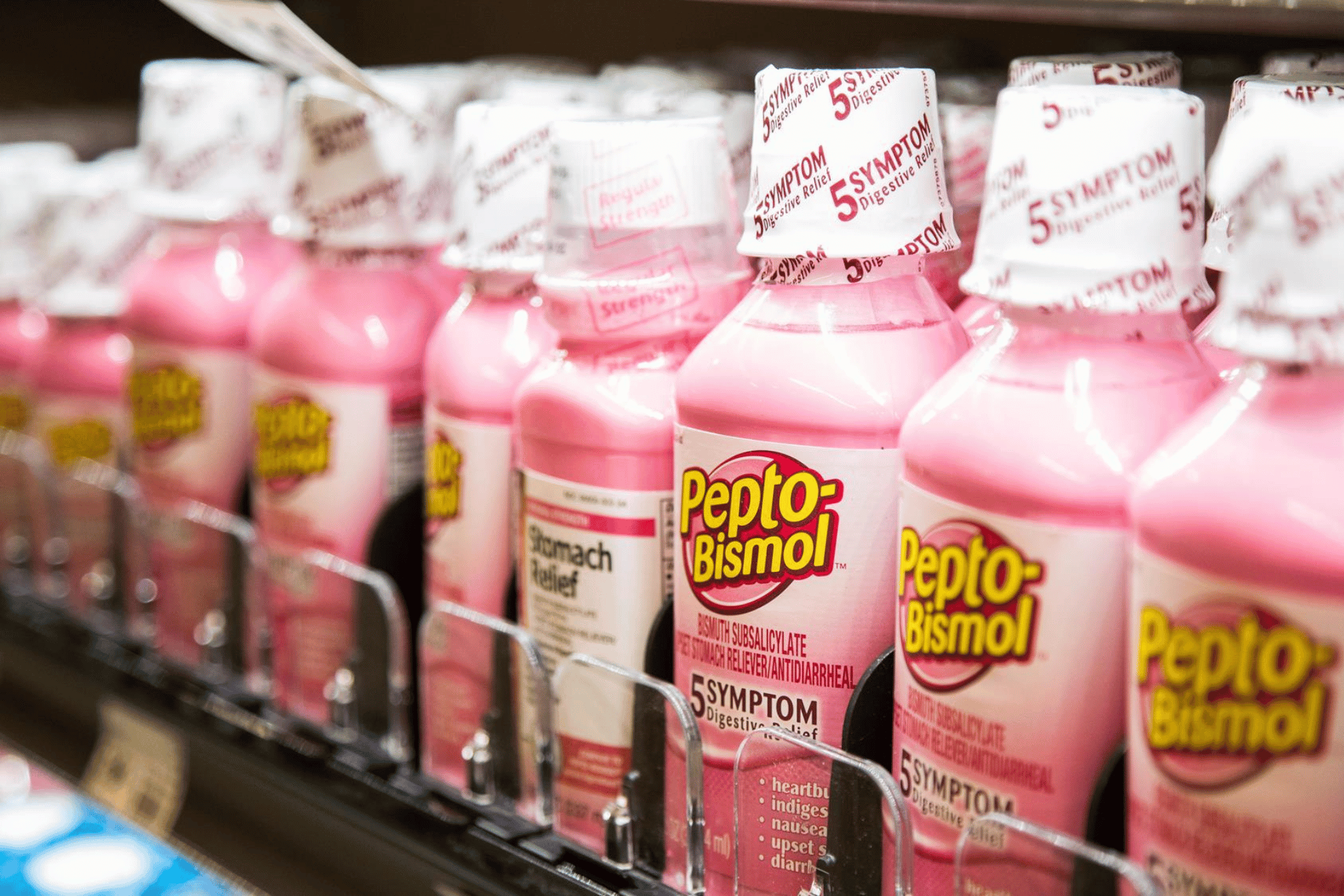Pepto-Bismol Can Cause Constipation. Here’s What To Do About It
Key Takeaways:
Because of how it works, Pepto may cause constipation in some people.
To relieve constipation from Pepto-Bismol, stop taking the medication, stay hydrated, get more physical activity, create routine bathroom habits, and increase your fiber intake. For significant constipation that doesn’t go away soon after you stop taking Pepto-Bismol, try an over-the-counter laxative or stool softener.
If your constipation doesn’t go away in a few days, talk to your doctor.
What is Pepto-Bismol?
Pepto-Bismol is one of the most well-known over-the-counter medications in the world for treating diarrhea, indigestion, and other stomach-related issues.
Can Pepto-Bismol cause constipation?
Yes, it’s possible to develop constipation after taking Pepto-Bismol. It’s designed to counteract diarrhea, and while constipation is not a guaranteed side effect of Pepto-Bismol, it’s fairly common.
This article may contain links to products. When you purchase anything using a link on this page, I get a small commission at no additional cost to you.
How to relieve Pepto-Bismol constipation
If you get constipated as a result of taking Pepto-Bismol, here’s how to get things moving again:
- Increase your fiber intake: Consuming more fiber-rich foods like fruits, vegetables, whole grains, and legumes can help soften your stool and make it easier to pass.
- Stay hydrated: Drinking plenty of water and other non-caffeinated fluids help soften your stool and prevent dehydration, which can contribute to constipation.
- Get moving: Engaging in regular physical activity can help stimulate your intestines and encourage bowel movements.
- Limit your use of Pepto-Bismol: If your constipation persists, consider using Pepto-Bismol less frequently or discussing alternatives with your doctor to help manage your symptoms without side effects.
- Try over-the-counter remedies: If necessary, you can use over-the-counter stool softeners or gentle laxatives such as Metamucil to help relieve constipation. Follow every product’s directions and consult your doctor before using any new medications. Supplements like fiber, probiotics, chia seeds, and magnesium can also help.
- Drink naturally laxative beverages: Drinking beverages like apple juice, prune juice, coffee, and tea can all get your digestive system moving with a gentle laxative effect.
- Establish a regular bathroom routine: Setting aside specific times each day to use the restroom can help train your body to have more regular bowel movements.
If your constipation persists or becomes severe, consult your healthcare provider for further evaluation and guidance.
Why do you get constipated when using Pepto-Bismol?
Constipation can happen when you use Pepto-Bismol because of its active ingredient, bismuth subsalicylate. This compound is designed to help treat diarrhea by reducing the amount of fluid in your intestines and slowing down the movement of your bowels.
This is beneficial when dealing with diarrhea but can sometimes stop you up, especially if your body is sensitive to the medication.
How to prevent Pepto-Bismol constipation
Know that taking Pepto makes you constipated, but need to use it for other digestive symptoms? To minimize the risk of constipation while using Pepto-Bismol, there are a few steps you can take:
- Follow the recommended dosage: Taking the correct dosage of Pepto-Bismol as instructed on the packaging or by your healthcare provider can help reduce the risk of constipation. Overusing the medication might increase your likelihood of experiencing constipation.
- Stay hydrated: Drinking plenty of water helps keep your digestive system functioning properly and prevents constipation. Aim for at least 8 glasses of water a day, but consult with your healthcare provider for personalized recommendations if you frequently take this antidiarrheal.
- Incorporate fiber into your diet: Eating a fiber-rich diet promotes regular bowel movements. Foods like fruits, vegetables, whole grains, and legumes are excellent sources of fiber.
- Exercise regularly: Physical activity can stimulate your digestive system and help prevent constipation. Aim for at least 30 minutes of moderate exercise most days of the week.
- Don’t ignore the urge to go: When you feel the urge to have a bowel movement, don’t put it off. Delaying bowel movements can contribute to constipation.
- Only take Pepto-Bismol when you need it: If you’re not experiencing the symptoms Pepto-Bismol treats (nausea, heartburn, indigestion, upset stomach, and diarrhea), don’t take the medication.
If you’re constipated for more than a day or two while using Pepto-Bismol, discuss your concerns with your healthcare provider.
They can recommend alternative treatments or adjustments to your current regimen to help alleviate your symptoms and still address the problem you needed an OTC digestive relief medication for in the first place.
Read Next: Green Poop: Concerning? Causes & When To Call the Doctor
Side effects of Pepto-Bismol
While Pepto-Bismol is generally safe for short-term use, it’s associated with several possible side effects. These side effects are usually temporary and not harmful, but it’s important to know what to expect when using the medication.
Constipation
As we discuss above, Pepto can cause constipation by slowing the movement of material through the digestive tract.
Black or dark stool
One of the most common side effects of Pepto-Bismol is black or dark stool.
Your stomach acid breaks down its main ingredient (bismuth subsalicylate) into bismuth and salicylic acid. When the bismuth in the medication reacts with sulfur in your gastrointestinal tract and saliva, it forms a black compound called bismuth sulfide.
This discoloration is harmless and should disappear within a few days of stopping the medication.
Black tongue
Black tongue is another side effect you may experience due to the bismuth reacting with sulfur, resulting in a temporary discoloration of your tongue. Like with dark stool, this side effect should go away once you stop taking the medication.
Bowel blockage
While rare, bowel blockage is a serious side effect that can occur due to Pepto-Bismol-related constipation. This is a particular concern for adults aged 65 and older.
If you suspect you may have a bowel blockage, contact your healthcare provider immediately for guidance and treatment.
Reye’s Syndrome in children
Pepto-Bismol contains a subsalicylate, which is in the aspirin family. Aspirin use in children and teenagers is associated with a risk of Reye’s Syndrome, a rare but potentially life-threatening illness.
This risk is especially high for those who have chickenpox, influenza (the flu), or any other type of viral infection.
To minimize this risk, Pepto Kids, a formulation containing calcium carbonate, is designed to safely treat heartburn and upset stomachs in children.
Dosage & how to take
When taking Pepto-Bismol, always follow the recommended dosage guidelines. You can find the medication in caplet, liquid, or chewable tablet forms.
For adults (ages 12 and up), the maximum dosage is 8 regular strength or 4 extra-strength tablets per day. In liquid form, the maximum dosage is 120 ml or 8 tablespoons per day.
Adults should not take more than 2 regular-strength tablets at one time (262 mg/tablet), with an interval of every 30 minutes to 1 hour as needed.
For regular strength liquid Pepto-Bismol, 30 ml or 2 tablespoons contain 525 mg of the active ingredient. In the extra-strength liquid form, 30 ml contains 1,050 mg of the active ingredient.
For children (ages 2-5 and/or 24-47 pounds), the maximum dosage of Pepto Kid’s is 3 tablets per day, taken in doses of one tablet at a time as needed.
For children (ages 6-11 and/or 48-95 pounds), the maximum dosage of Pepto Kid’s is 6 tablets per day, taken in doses of 2 tablets at a time as needed.
Children’s Pepto-Bismol does not contain bismuth subsalicylate but instead has antacids for treating upset stomachs in children.
Children under age 2 and/or weighing under 24 pounds should not take Pepto Kid’s (or Pepto-Bismol) without consulting a physician.
Who should avoid taking Pepto-Bismol?
Certain individuals should avoid taking Pepto-Bismol due to potential risks. These groups include:
- Pregnant Women: Pepto-Bismol may harm a developing fetus, so it’s important to consult your doctor before taking it during pregnancy. Pregnant women should avoid taking it altogether after the 20th week of pregnancy. If you’re planning to get pregnant or are breastfeeding, talk to your doctor before using Pepto-Bismol, as it should be avoided during breastfeeding.
- Children: Pepto-Bismol contains an ingredient from the salicylate family, which isn’t recommended for children and teenagers with flu or chickenpox. Additionally, children who have received the chickenpox vaccine within the last 6 months should not be given Pepto-Bismol. The salicylate ingredient can cause a serious medical condition called Reye’s Syndrome in children.
- Individuals with certain medical conditions: Avoid taking Pepto-Bismol if you have bleeding problems such as hemophilia, an actively bleeding ulcer, bloody or black stools, or Von Willebrand disease. Also, avoid it if you have a history of severe allergic reactions to aspirin or NSAIDs like naproxen and ibuprofen.
- People taking other salicylate-containing medications: If you’re taking other medications containing salicylate, such as aspirin, avoid using Pepto-Bismol to prevent potential interactions or adverse effects.
- People with IBS-C: If you have constipation-predominant Irritable Bowel Syndrome (IBS), it’s a good idea to avoid Pepto-Bismol.
Related: How To Get Rid Of Metformin-Induced Diarrhea
When to call your doctor
While constipation can be uncomfortable, a short-term slowdown in digestion is usually not a cause for concern. However, there are certain situations in which you should seek out medical advice:
- Persistent constipation: If your constipation doesn’t improve after trying the steps mentioned above or lasts for more than a week, it’s a good idea to consult your doctor.
- Severe pain: If you’re experiencing intense abdominal pain, bloating, or discomfort that isn’t relieved by passing gas or having a bowel movement, contact your healthcare provider.
- Blood in your stool: If you notice dark, tarry or bloody stools, this could be a sign of a more serious issue. Consult with a qualified healthcare professional immediately.
- Mucousy stool: If you notice mucus in your stool for more than a few days, you might be experiencing inflammation of your liver, pancreas, or kidneys.
- Unexplained weight loss: If you’re losing weight without trying and also experiencing constipation, this could be a symptom of an underlying medical condition that needs attention.
- Frequent use of Pepto-Bismol: If you find yourself relying on Pepto-Bismol more than 3 times a month to manage your symptoms, discuss this with your healthcare provider to find out if an underlying issue needs to be addressed.
- Nausea and vomiting: These may be signs that you’re allergic to Pepto-Bismol or have a more serious medical condition.
- Ringing in your ears or hearing loss: This condition, known as tinnitus, can occur if you experience salicylate toxicity. It’s typically harmless but should go away when you stop taking the medication.


